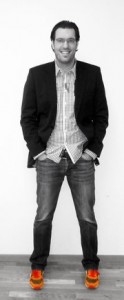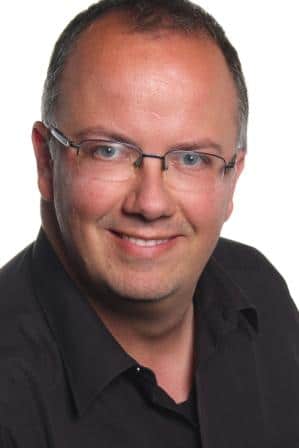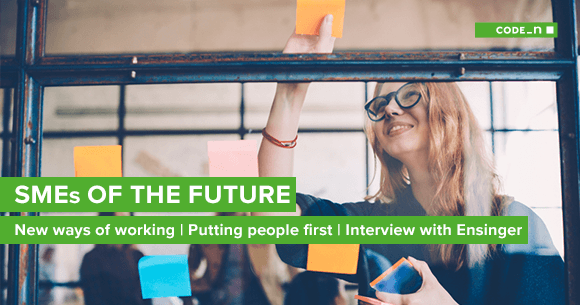PETER AMBROZY: “AFTER THE IDEA ITSELF, THE MOST IMPORTANT THINGS ARE FEASIBILITY, AND ABOVE ALL THE TEAM”PETER AMBROZY: „NEBEN DER IDEE ALS SOLCHES IST DIE UMSETZBARKEIT UND VOR ALLEM DAS TEAM AM WICHTIGSTEN“
 Peter Ambrozy in a digital conversation with Oliver Gassner about why he also likes to use Facebook as a business network, the importance of prototyping for startups, how startups can make their mark at trade fairs, and the point at which companies outgrow the “startup” label.
Peter Ambrozy in a digital conversation with Oliver Gassner about why he also likes to use Facebook as a business network, the importance of prototyping for startups, how startups can make their mark at trade fairs, and the point at which companies outgrow the “startup” label.
Oliver Gassner: Hello Peter, would you please introduce yourself to our readers?
Peter Ambrozy: Hello, Oliver. I’m the founder of edelight.de and investor in regiohelden.de.
OG: We should perhaps add that Edelight is a social shopping site, and that Regiohelden does local Internet advertising via Google Adwords. Can you even still call Edelight a startup, or would you already describe yourselves as an established company?
PA: Edelight has evolved into an e-commerce enabler that set up the tracdelight.com fashion network parallel to its edelight.de social shopping portal. On tracdelight.de, we link shops such as Amazon, Zalando and others to publishers like instyle.de, stylebook.de and t-online. The Regiohelden description fits.
OG: And, is Edelight still a startup?
PA: After five years, our core business is certainly no longer a pure startup. But since we’re constantly expanding our business model while maintaining the same startup culture, we would still call ourselves one.
OG: How can you tell when a startup has transitioned to a “normal company”?
PA: There’s the danger of devoting all of your attention to meetings and processes rather than market potential and innovation. The people also make a more “well-fed” impression. So we try to stay mentally and procedurally lean.
OG: What’s the web or mobile app that changed your life or work the most?
PA:Twitter and Facebook. Twitter has become my daily news aggregator, and Facebook lets me interact with my network much more authentically than Xing.
OG: Can you briefly outline how they changed your work? Do they only pertain to the company, or your personal communication as a whole?
PA: Twitter is an extremely efficient way to filter key developments. I do it every morning as a kind of start to the business day. Facebook has blurred the line between my private and business lives in relation to my professional network. I can get to know people there not only as business partners, but also in their personal lives (as fathers, soccer players, etc.). Previously, they had only been managers, bloggers, etc.
OG: Could Facebook become a business network?
PA: Yes and no.
OG: Because…
PA: I’m undecided about whether I want to share all my private information with my professional network.
OG: I always say that if something’s really private, you’re not going to post it on the net anyway.
PA: Or it doesn’t interest everyone. If I were to post pictures of my son playing soccer every weekend, it could get on people’s nerves after a while.
OG:CODE_n is a competition for entrepreneurs in the mobile sector. How important are competitions and prizes for business founders?
PA: I think competitions and prizes are important because they help founders reflect on their idea time and again, while receiving feedback from a wide variety of sources. That was extremely useful for us. At the same time, they can be a good source of income in the early days. With justaloud.com [www.justaloud.com], we won around 50k in prize money. That’s helpful, especially at the start.
OG: How important is the PR aspect? Can it attract users, or even investors?
PA: Yes, it’s definitely a factor. Basically, it amounts to a relatively cost-effective but very goal-oriented public relations or communication campaign.
OG: If you were on a jury for a startup competition, what would you be looking for in order to put a startup at the top of your list?
PA: Only two weeks ago, I was on the Startup Weekend jury, and after the idea itself, the most important things are feasibility, and above all the team. And with feasibility, I not only mean an interesting innovation, but also a viable business model.
OG: And what would the team have to look like? Would two technical types like Brin and Page still get money today?
PA: It’s quite conceivable in the current hype. Two techies and one business-management type would be better, though.
OG: There shouldn’t be more initially?
PA: I personally think three founders are optimal.
OG: What do startups really need from the outside – connections, good advice, money?
PA: You can’t generalize about that. I think they should not only be convinced of their idea on paper, they should also be in a position to develop a prototype and test it on the market. Then there’s a long phase where it depends on the stamina of the people. Many teams fail at that point.
OG: Actually, what I meant was external help – do they need advice from angels and VCs or their contacts, or is money from investors enough?
PA: External funding is particularly important for technology companies, of course. But not from the first day onward. That naturally applies primarily to the web environment. If you have a good idea, a working prototype, and usable initial market intelligence, then doors open by themselves. That’s how it was for us. Oh yes – and we also did it that way with Regiohelden.
OG: What role did it play that Edelight became a part of Burda at some point? Were there advantages? Disadvantages?
PA: None really. Burda consists of over 80 legally independent units. We’re one external entity among many. The collaboration with the venture arm (Acton Capital) was very helpful, however, since the team gave us very good support at all times.
OG: CODE_n winners will receive exhibition space at CeBIT in a special shared CODE_n area. What’s your killer tip for startups on how to make the most of such an opportunity?
PA: Heh heh. I’m not telling. Otherwise, the Regiohelden will no longer stand out at trade fairs. Sorry, just kidding… Attention, attention, attention.
OG: So the seedlings that Regiohelden handed out last year grew well – it was watercress, wasn’t it?
PA: At one fair, Regiohelden hired a magician. No one had done that before, and the booth was full in no time. And since Regiohelden also has a super product, it was then possible to direct most people toward the product.
OG: What’s the coolest thing you’ve seen at a smaller-scale trade fair presence? The half-naked samba girls like those at CeBIT?
PA: There were also half-naked people at demxco. I can’t remember the company, though. I haven’t had a positive experience at a fair. Mostly there are big booths of the major brands. So as a small player, you need good ideas, like the magician.
OG: If you were to name a startup (in Germany, Austria or Switzerland, but outside of Stuttgart 😉 ) that we should interview, who would it be, and why?
PA: It’s not very objective of me, but Regiohelden are really rocking right now and are set to become the fastest-growing startup in the region. Otherwise, you might want to interview the Startup Weekend winners: PocketGuide (Pocketvillage).
OG: What exactly do they do?
PA: A mobile app for local content. A good fit to CODE_n.
OG: Thanks for taking the time to speak to us. 😉
PA: Thank you for the opportunity. Take care! Peter Ambrozy erklärt im digitalen Gespräch mit Oliver Gassner warum er Facebook auch gerne als Business-Netzwerk nutzt, wie wichtig Prototypen für Startups sind, wie Startups auf Messen überzeugen können und ab wann ein Startup eigentlich gar keins mehr ist.
Peter Ambrozy erklärt im digitalen Gespräch mit Oliver Gassner warum er Facebook auch gerne als Business-Netzwerk nutzt, wie wichtig Prototypen für Startups sind, wie Startups auf Messen überzeugen können und ab wann ein Startup eigentlich gar keins mehr ist.
Oliver Gassner: Hallo Peter, würdest du dich sich unseren Lesern bitte kurz vorstellen?
Peter Ambrozy: Hallo Oliver. Ich bin der Gründer von edelight.de und Investor der regiohelden.de.
OG: Wir sollten eventuell sagen, dass Edelight Social Shopping macht und Regiohelden lokale Internetwerbung via Google Adwords. Ist Edelight überhaupt noch ein Startup? Oder würdest du euch schon als etablierte Firma bezeichnen?
PA: Edelight ist mittlerweile ein E-Commerce-Enabler, das neben dem Social Shopping-Portal edelight.de auch ein Fashion-Netzwerk tracdelight.com aufgebaut hat. Dort verbinden wir Shops wie z.B. Amazon, Zalando und Co. mit Publisher wie instyle.de, stylebook.de und t-online. Die Regiohelden Beschreibung passt.
OG: Und, ist Edelight noch ein Startup?
PA: Im Kerngeschäft sind wir mit 5 Jahren sicherlich kein reines Startup mehr. da wir aber ständig unser Geschäftsmodell erweitern und gleichzeitig die Startup-Kultur pflegen, würden wir uns noch immer als ein solches bezeichnen.
OG: Woran merkt man den Übergang von Startup zur „Normalfirma“?
PA: Es besteht die Gefahr, dass man sich nur noch mit Meetings und Prozessen beschäftigt und weniger mit Marktpotentialen und Innovationen. Die Leute wirken außerdem “satter”. Wir versuchen daher mental und prozessual schlank zu bleiben.
OG: Was war die App im Web oder mobil, die Deinen Alltag oder Deine Arbeit am meisten verändert hat?
PA:Twitter und Facebook. Twitter ist mein täglicher News-Aggregator geworden. Und durch Facebook kann ich viel authentischer in Kontakt mit meinem Netzwerk agieren als mit Xing.
OG: Kannst du das kurz skizzieren, wie die beiden deine Arbeit verändert haben? Nur was die Firma selbst angeht oder deine ganze Kommunikation als Person?
PA: Twitter ermöglicht es mir extrem effizient wichtige Entwicklungen zu filtern. das mache ich jeden Morgen quasi als Start in den Business-Tag. Facebook hat die Grenze zwischen privat und Business – bezogen auf mein berufliches Netzwerk – gesenkt. Dort lerne ich jetzt nicht nur die Person als Businesspartner, sondern auch als Mensch (Vater, Fußballspieler, etc.) kennen. Davor war die gleiche Person einfach nur Geschäftsführer, Blogger, etc.
OG: Könnte Facebook zum Businessnetzwerk werden?
PA: Jein.
OG: Weil?
PA: Ich bin noch indifferent, ob ich all meine privaten Daten meinem beruflichen Netzwerk mitteilen möchte.
OG: Ich sag immer: Was wirklich privat ist, tippt man eh nicht ins Internet.
PA: Oder es interessiert auch nicht jeden. Wenn ich am WE die Bilder meines Sohnes beim Fußball veröffentliche, dann kann das jemanden auch auf Dauer nerven.
OG:CODE_n ist ein Wettbewerb für Gründer im Bereich „mobile“; wie wichtig sind Wettbewerbe und Preise für Gründer?
PA: Wettbewerbe und Preise sind m.E. wichtig, da sie den Gründern helfen, ihre Idee immer wieder zu reflektieren und sie gleichzeitig unterschiedlichstes Feedback bekommen. Das war für uns extrem hilfreich. Gleichzeitig kann es auch eine gute Einnahmequelle am Anfang darstellen. Wir haben mit justaloud.com ca. 50k Preisgelder gewonnen. Das hilft gerade zum Start.
OG: Wie wichtig ist der PR-Aspekt? Kann das auch User oder gar Investoren bringen?
PA: Ja, das kommt auf jeden Fall dazu. Im Grunde entspricht es einer relativ günstigen, aber sehr zielorientierten PR bzw. Kommunikation.
OG: Wenn Du in einer Jury für einen Gründerwettbewerb wärst: Wonach würdest Du bei einem Startup suchen, um es ganz oben auf die Votingliste zu setzen?
PA: Ich war gerade vor zwei Wochen in der Jury des Startup-Weekends und dort ist neben der Idee als solches, die Umsetzbarkeit und vor allem das Team am wichtigsten. Mit der Umsetzbarkeit meine ich allerdings auch, dass es sich um ein tragfähiges Geschäftsmodell handelt und nicht nur um eine interessante Innovation.
OG: Und wie muss das Team beschaffen sein? Würden zwei Techniker wie Brin und Page nochmal Geld kriegen heute?
PA: Im aktuellen Hype ist das durchaus vorstellbar. Zwei Techis und ein BWLer wären allerdings noch besser.
OG: Größer sollte es anfangs nicht sein?
PA: Drei Gründer finde ich persönlich optimal.
OG: Was brauchen Startups von außen her wirklich: Connections, guten Rat, Geld?
PA: Das kann man so nicht pauschalisieren. Ich denke sie sollten von ihrer Idee nicht nur auf dem Papier überzeugt sein, sondern auch in der Lage, einen Prototypen zu entwickeln und am Markt zu testen. Danach kommt dann eine lange Phase, wo es auf das Durchhaltevermögen der Personen ankommt. An dieser Stelle scheitern viele Teams.
OG: Ich meinte jetzt: Von außen, also brauchen sie mehr Beratung von Angels und VCs oder deren Kontakte oder einfach nur das Geld der Investoren?
PA: Geld von Externen ist gerade für Technologie-Unternehmen natürlich wichtig. Allerdings nicht ab dem ersten Tag. Dies gilt natürlich primär für das Web-Umfeld. Wenn Du eine gute Idee hast, einen funktionierenden Prototypen und erste sinnvolle Markterkenntnisse, dann öffnen sich die Türen von alleine. So war es bei uns. Ach ja. so haben wir es auch bei den Regiohelden gemacht.
OG: Welche Rolle hat es gespielt, dass Edelight irgendwann Teil von Burda war? Vorteile, Nachteile?
PA: Keine wirkliche. Burda besteht aus ca. 80+ rechtlich selbständigen Einheiten. Da sind wir ein externer von vielen. Die Zusammenarbeit mit dem Venture-Arm (Acton Captial) hingegen war sehr hilfreich, da uns das Team inhaltlich jederzeit sehr gut unterstützt hat.
OG: Der Preis für den Sieg bei CODE_n ist ein Ausstellungsplatz zusammen mit anderen Gewinnern auf der CeBIT auf einer speziellen CODE_n-Fläche. Was ist Dein Killer-Tipp für ein Startup, wie sie diese Gelegenheit optimal nutzen können?
PA: Hehe. sag ich dir nicht. Sonst können sich die Regiohelden auf den Messen nicht mehr differenzieren. Nein, Scherz… Attention, Attention, Attention.
OG: Also die Pflänzchen, die Regiohelden verteilt haben sind gut aufgegangen – ich glaub Kresse war‘s, ja?
PA: Die Regiohelden auf einer Messe z.B. einen Zauberer engagiert. das hatte niemand gemacht und prompt war der stand voll. Da das Produkt der Helden ebenfalls super ist, konnten die meisten Personen auch sinnvoll auf das Produkt überführt werden.
OG: Eher halbnackte Sambagirls wie bei der CeBIT? Was war das Coolste, was du bisher bei einem Messeauftritt kleineren Formats gesehen hast?
PA: Halbnackte Menschen gab‘s auch mal auf der demxco. Allerdings kann ich mich nicht mehr an die Firma erinnern. Habe kein positives Erlebnis an eine Messe. Meistens sind es dort die großen Stände, von den großen Marken. Daher musst du ja als kleiner Player mit guten Ideen wie z.B. dem Zauberer auftrumpfen.
OG: Wenn du ein Startup (in DACH aber außerhalb von Stuttgart 😉 ) benennen könntest, das wir interviewen sollten: Wer wäre das und warum?
PA: Ist zwar nicht ganz objektiv, allerdings rocken die Helden aktuell extrem und werden m.E. zum schnell wachsensten Startup der Region werden. Ansonten könntest du mal den Gewinner des Startup-Weekends interviewen. PocketGuide (Pocketvillage).
OG: Was machen die genau?
PA: Eine mobile App für lokale Inhalte. Passt ja zu CODE_n.
OG: Danke für das Gespräch und deine Zeit 😉
PA: Danke für die Möglichkeit. Schöne Grüße an den Bodensee.






Write a comment